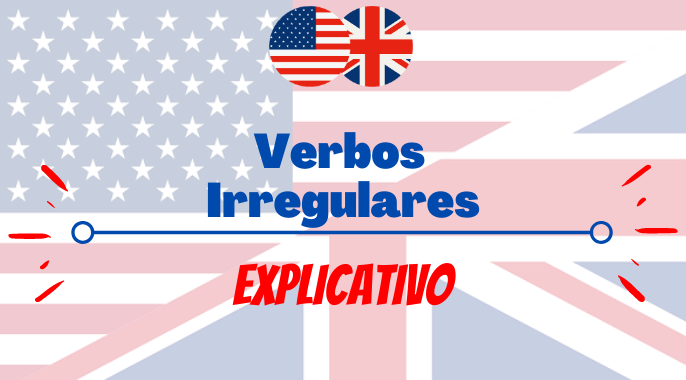
A maioria dos estudantes tem medo dos famosos verbos irregulares. Em primeiro lugar, precisamos garantir que eles são verbos normais como qualquer outro, com a diferença que possuem uma conjugação especial.
Certamente você já recebeu e leu algumas listas de verbos e perdeu muito tempo memorizando-os, mas a técnica mais adequada para aprendê-los é construir suas frases dentro do seu cotidiano.
Vamos ver nesta aula alguns detalhes importantes a respeito destes importantes verbos que são usados em tempos verbais como o Passado Perfeito ou Presente Perfeito, por exemplo. Sua lista de verbos possui três colunas e a terceira é ligada ao particípio passado – se o verbo é regular, este possui duas colunas iguais – a segunda e a terceira – exemplo: work – worked – worked.
No caso dos irregulares a regra é que há mudanças significativas.
Veja a seguinte tabela abaixo:
| Buy | Bought | Bought |
| Bring | Brought | Brought |
| Let | Let | Let |
| Speak | Spoke | Spoken |
| Write | Wrote | Written |
| Cut | Cut | Cut |
| Go | Went | Gone |
| Blow | Blew | Blown |
| Deal | Dealt | Dealt |
| Fight | Fought | Fought |
É uma pequena lista de apenas dez verbos, mas é possível entendê-los – observe as formas que os verbos se encontram nas três colunas.
Na segunda coluna usamos o Simple Past
Frases afirmativas
Veja estes exemplos no Simple Past
I went to school last weekend.
She bought a new house last Saturday.
He wrote an e-mail in the morning.
I cut my finger last week.
I dealt with Asian people in my job last year.
Observe que os verbos estão na segunda coluna da lista acima – apenas em frases afirmativas!
Veja mais exemplos:
Where did you go in your last vacation?
I went to Europe in my last vacation.
What did you buy today?
I bought tomatoes, potatoes and fruits.
How did you cut your finger?
I cut my finger in the kitchen preparing a meat.
Frases negativas
Observe como funciona
O verbo retorna ao infinitivo devido a presença do auxiliar DID.
I didn’t buy fruits in the supermarket.
She didn’t write a book last year.
My father didn’t go to Europe last month.
I didn’t deal with suppliers in my last job.
I didn’t bring my umbrella! It is raining!
Veja que nas frases negativas o verbo volta a forma normal – DID + NOT + VERBO NO INFINITIVO.
Mais exemplos:
Did you go to the USA last year?
I didn’t go to the USA last year.
Did you buy fruits in the supermarket?
I didn’t buy fruits in the supermarket.
Did you bring your passport?
Oh My God! I didn’t bring my passport and my flight will be in two hours!
Podemos observar que os verbos irregulares também são fáceis de usar. Tudo é uma questão de praticar e entender o posicionamento dos mesmos nas frases.
Frases interrogativas
Where did you buy your car?
I bought my car in Atlanta.
What did you bring for your father?
I brought two bottles of white wine. He loves it.
Did you speak English in Japan?
Yes, I spoke English in Tokyo.
Observe que nas perguntas, o verbo fica no infinitivo – nas respostas o verbo está no passado – na segunda coluna.
VERBOS IRREGULARES NO PRESENT PERFECT
Os verbos irregulares no Present Perfect também são usados – utilizamos a terceira coluna para a construção das frases. A regra é a mesma do Simple Past – nas frases afirmativas o verbo é utilizado na forma conjugada. Nas negativas e interrogativas o verbo retorna a forma normal – primeira coluna. Outro detalhe é que usamos os auxiliares HAVE / HAS + PAST PARTICIPLE.
Veja alguns exemplos:
I have bought lots of fruits for my mother.
She has cut her finger.
I have written a letter! Amazing – I have just ignored my e-mail.
I have gone to Europe.
He has dealt with lots of European people.
Observe que no Present Perfect os verbos estão na terceira coluna da lista acima.
Mais exemplos:
Where have you gone?
I have gone to my parents’ house.
What have you bought in the supermarket?
I have bought fruits, rice, beans and potatoes.
Who have you dealt with in London?
I have dealt with suppliers and supervisors.
Vamos praticar?
Exercises:
A) Peter has gone – has went – have gone to Australia.
B) Paul have bought – has bought – has buying cars in Miami.
C) I have not went – have not go – have not been in Canada before.
D) Have you bought – Have you buying – Have you buys fruits?
E) Has your father go – Has your father gone – Has your father went to Chile?
F) Pete has swum – have swim – have swum in the club.
G) Paul and Mary have brought – have bring – has brought flowers.
H) Stephanie has cutting – has cut – has been cutting her finger in the kitchen.
I) I have not write – have written not – have not written e-mails.
J) Paul has blown – has blew – has blow a candle.
Você agora está bem informado sobre os usos dos verbos irregulares e pode formar frases com mais certeza. O inglês é assim, vamos assimilando novos conteúdos dia após dia até alcançarmos um nível satisfatório.
Quer aprender mais? Abaixo tem mais outras grandes opções de postagens e você só tem a ganhar passando mais alguns minutos adquirindo conhecimento.
Explicação sobre few, little, much e many ⇠